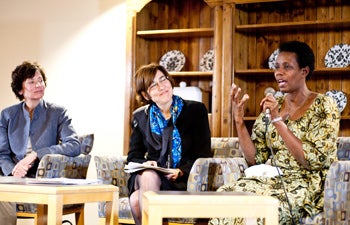Strength Through Adversity
USC students, faculty and the public listened to Rose Mapendo’s harrowing story of living in a death camp with her children in the Democratic Republic of the Congo.
Although Mapendo’s husband was executed in the camp, the Tutsi Congolese widow and mother faced her fate with strident courage.
On International Women’s Day March 8, Mapendo told her story of survival during the roundtable discussion, “Strength Through Adversity: Women and Mass Violence,” held by the USC Shoah Foundation Institute housed in USC Dornsife, and The Holocaust and the United Nations Outreach Programme.
Panelists reflected on testimony of survivors from past genocides and mass atrocities occurring today in an effort to empower women throughout the world.
“I am not a victim anymore,” Mapendo said. “I’ve been through and experienced a lot; all this work I do is to give back for what God has done in my life and to speak on behalf of women who cannot speak for themselves.
“We have to help women who don’t have anything — women who live life in a cage because they must rely on men for everything,” she said. “We have to stand up and change the mindset of women. Let us help to push the elephant together.”
USC Vice Provost Beth Meyerowitz, professor of psychology and preventive medicine in USC Dornsife, moderated the discussion.
Panelists included Alison Dundes Renteln, professor of political science and anthropology in USC Dornsife; Sabina VajraÄÂa, Bosnian American film director, screenwriter and producer; Kimberly Mann, manager of The Holocaust and the United Nations Outreach Programme in New York, and Mapendo. The Hon. Abdullah Aimaque, consul-general of Afghanistan in Los Angeles also spoke.
“The USC Shoah Foundation Institute is grateful to have had this opportunity to bring focus to the experiences of women survivors who have become advocates for all women,” said Executive Director of the USC Shoah Foundation Institute Stephen Smith. “We thank The Holocaust and the United Nations Outreach Programme for partnering with us, and for sharing our vision of genocide remembrance and education as a mechanism for changing the world.”

Mapendo answered questions and reflected on the testimony of survivors from past genocides and mass atrocities occurring today during the discussion. Photo by Kim Fox.
Established in 1994 by Steven Spielberg to collect and preserve testimonies of survivors and other witnesses of the Holocaust, the USC Shoah Foundation Institute’s mission is to overcome prejudice, intolerance and bigotry through the educational use of the institute’s nearly 52,000 video testimonies. The archive represents 56 countries in 32 languages and is the largest of its kind in the world.
Mapendo recounted being covered in lice and fleas in a concrete slab cell with 34 other prisoners. Her faith in God and love for her children gave her the will to live. She and her children survived and resettled in the United States.
Now Mapendo speaks on behalf of women everywhere who experience discrimination daily. In 2009, she launched Mapendo New Horizons, an Arizona based nonprofit organization that gives hope to vulnerable survivors by using microenterprise, education and healthcare to improve the lives of women and girls.
“We have to accept one another and work together,” said Mapendo, who received a CNN Heroes award for her efforts.
Panelist Mann told the audience that women today can learn from Mapendo and other survivors’ leadership, courage, compassion and intelligence. She underscored her point by telling the story of Roza Robota, one of four women involved in the Sonderkommando revolt in 1944. The 23-year-old hid a gun-powder type compound in her skirt hem and led the demolition of Auschwitz II’s Crematorium III. After refusing to reveal the names of others involved, the women were interrogated, tortured and hanged.
“I think we can all learn from their courage, compassion and strength,” Mann said.
Speakers also discussed uniting with other countries to ensure women elsewhere in the world are granted basic human rights.
During her presentation, Renteln discussed how international laws have evolved throughout history to protect women’s rights, but laws providing protections to religious freedoms and cultural practices have sometimes taken precedent, creating a “hierarchy problem.” Violence against women continues today in the form of honor killings, in which male and female relatives punish female family members through torture, rape or death for bringing what they consider to be dishonor upon the family.
“Some of these blatant forms of violence against women clearly show that ‘cultural rights’ must give way to women’s rights,” Renteln said.
In his work, Aimaque seeks to change practices concerning women deprived of basic rights under Taliban rule in Afghanistan.
“It is time for all of us to stand together as partners,” Aimaque said. “And provide protection, improve governments and built security forces so we can accomplish our mission and make the world a better place for men, women and children.”
Rose Mapendo, a Tutsi Congolese widow and mother who survived life in a death camp in the Democratic Republic of the Congo, shared her personal story of survival during the roundtable discussion, “Strength Through Adversity: Women and Mass Violence,” held by the USC Shoah Foundation Institute housed in USC Dornsife, and The Holocaust and the United Nations Outreach Programme on International Women’s Day.
Mapendo answered questions and reflected on the testimony of survivors from past genocides and mass atrocities occurring today during the discussion.